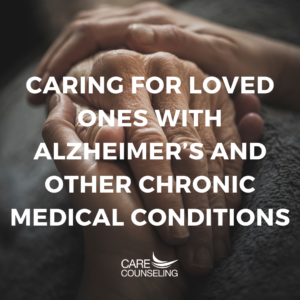Relief for Caretakers: Reducing Risk of Caregiver Stress
 Caregivers provide such valuable services yet are often taken for granted for the daily responsibilities that they consistently provide for those who need them.
Caregivers provide such valuable services yet are often taken for granted for the daily responsibilities that they consistently provide for those who need them.
Here are some of the tasks that are typical of a day:
- Food preparation and meal planning
- Housekeeping and laundry services
- Transportation to activities and appointments
- Assistance with feeding and eating
- Assistance with dressing, grooming, bathing, and toileting
- Help with mobility and exercise
- Administering medications and/ or nursing services
- Assistance with technology and finances
- Coordinating care with medical and mental health providers
- Researching information and advocating for the needs of the care recipient
Caregivers may include parents and primary caregivers of children or older adults. Caregivers work with those who are unable to fully care for themselves due to age-related vulnerabilities, cognitive limitations, medical needs, or severe and persistent mental health conditions.
A person who provides unpaid services to care for family, friends, or loved ones with their daily living and medical needs is considered an informal caregiver, whereas formal caregivers are often employed in settings such as long-term care daycare and residential treatment facilities. Other common professional settings include early childhood centers, schools, hospitals, nursing homes, and home healthcare services.
Certain populations face increased stressors related to caregiving. For example, Hispanic (21%) and African American (20.3%) individuals were reported to have the highest rates of caretaking, with both groups also reporting higher burnout rates in comparison to Asian-American and White caretakers. African American caretakers were more likely to be caring for both younger and older persons at the same time “sandwiched in the middle” while also balancing other responsibilities such as working full time. If you are interested in learning more about statistics related to caregiving, here is some great information: https://www.caregiver.org/resource/caregiver-statistics-demographics/
We all need a break at times, especially for those balancing multiple roles and lacking time for self-care. Caregiving is hard work, and the day-to-day responsibilities can feel overwhelming.
It is important to be aware of the following signs of caregiver stress:
- Denial
- Anger
- Social withdrawal
- Anxiety and depression
- Exhaustion (emotional and physical)
- Sleeplessness
- Irritability
- Lack of concentration
- Health problems
There are resources and strategies to help reduce caregiving stress. It is important to be proactive with reaching out for support to help manage stressors before they accumulate to where you feel too paralyzed to reach out.
Participate in respite care. https://www.dhs.state.mn.us/
Join a support group. Support groups can help clarify your roles and expectations as a caregiver, provide emotional support, and assist with connecting to resources,
Here are several local support group options:
Wilder’s Caregiver Support Groups: https://www.wilder.org/what-we-offer/healthy-aging-caregiving-services/support-groups-caregivers
Lutheran Social Service’s Caregiver Support and Respite: https://www.lssmn.org/services/older-adults/caregiver-support-respite
Family Means Support Group for Caregivers: https://www.familymeans.org/caregiver-support-groups.html
NAMI MN Support Groups: https://namimn.org/support/nami-minnesota-support-groups/
Caregiver Resources:
Minnesota Senior Linkage Line: 800-333-2433, Monday-Friday 8:00 a.m. – 4:30 p.m. https://www.minnesotahelp.info/
AARP: https://states.aarp.org/minnesota/caregiver-resources
Talk to a Therapist. At CARE Counseling, we are here to help and have same-week appointments available: https://care-clinics.com/
A therapist can help process thoughts, feelings, and experiences related to caretaking, including supporting mental health such as anxiety and burnout. Specific things your therapist may help with could include identifying areas that are within and outside your control and support with managing expectations and being realistic about responsibilities in addition to treatment for how stress impacts your mental health.
Written By: Charlotte Johnson, MA, LPCC



























